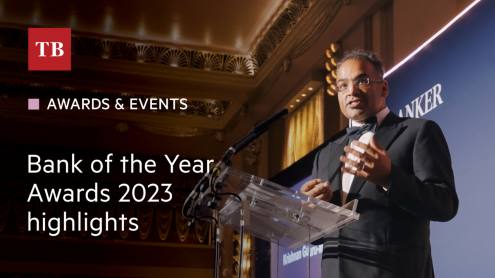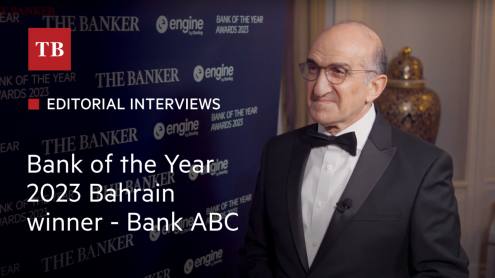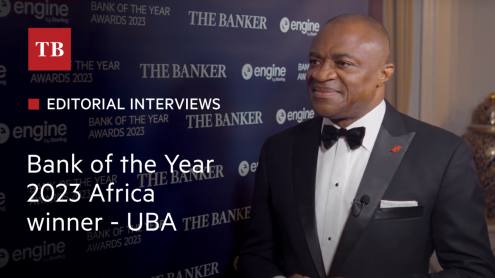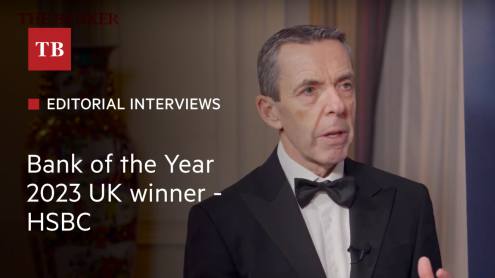Middle East winners:
Bahrain: Ahli United Bank
Though the lower oil price environment has hit Bahrain’s economy hard, it has done little to dent the performance of Ahli United Bank (AUB). The lender registered a 31.7% increase in net profits in 2014, accompanied by a 17.99% increase in Tier 1 capital and a 2.4% rise in total assets. AUB’s record net profit of $482.5m stemmed from the bank’s improved core earnings on account of enhanced net interest margins and average loan book growth. Meanwhile, the AUB Group as a whole achieved total operating income of more than $1bn for the first time since its inception in 2000.
“Despite the challenges in its operating markets, AUB continued to deliver a record performance on account of its strong underlying business fundamentals resulting from its effective risk management framework and its resilient and diversified business model,” says Adel Mohamed Abdelshafe El-Labban, group chief executive and managing director.
In April 2015, AUB successfully completed a $400m issue of additional Tier 1 perpetual Basel III-compliant capital securities. Strong investor demand for the securities saw the bank increase its total issue size from an initial $300m to $400m. Total demand hit $650m, while an attractive coupon of 6.875% was achieved. Meanwhile, the International Finance Corporation, a member of the World Bank Group, increased its stake in AUB by converting $100m in optionally subordinated convertible debt into ordinary shares in November 2014.
“In line with its strategy, AUB will continue to strengthen its position as a stronger regional player by pursuing organic and inorganic growth opportunities in its identified markets while seeking opportunities to develop cross-border business. AUB will further focus on client service and technology to enhance customer experience and satisfaction,” says Mr El-Labban.
For the fourth year in a row, Bank Pasargad has emerged as the country winner for Iran. The judges were once again impressed by the lender’s strong financials and the introduction of products and services in a highly challenging environment. In local currency terms, Bank Pasargad’s net profits jumped by 18.3% in 2014 following a 34.7% increase the previous year. Total assets also increased by 26.9%, while Tier 1 capital rose 18.1% in the same period.
“The Iranian banking system faced intensified sanctions over the past year, leading to further reductions in foreign trade activities. Other challenges included the sharp devaluation of the Iranian rial against the US dollar and a slowdown in investment activity pending the outcome of negotiations between Iran and the P5+1 powers,” says Majid Ghasemi, chief executive of Bank Pasargad.
Despite this challenging environment, the lender’s non-performing loans maintained their downward trajectory to reach 4.39%, from 4.54% in 2013. These strong financials were complemented by the bank’s commitment to innovation and product development. Over the past 15 months, Bank Pasargad has introduced about 30 e-banking services, including an e-wallet and mobile banking services.
In addition, the bank launched a low-value payment system known as Kippad. Expected to become fully operational in most of Iran’s major urban centres by early 2016, the Kippad system acts as a contactless intelligent card applicable to smaller payments including public transport and parking expenses.
Looking ahead, Bank Pasargad expects opportunities to emerge from the negotiations around its joint comprehensive plan of action. “The implementation of the [plan] will provide the bank with new opportunities to expand its international activities and network,” says Mr Ghasemi.
Declining exports, a strengthening shekel and regional instability have all weighed heavily on the Israeli economy in the past year. These difficulties have led the country’s banks to focus on the fastest growing and niche sectors of the economy to secure their development. Scooping this year’s award for Israel is Bank Hapoalim, the country’s largest lender by both Tier 1 capital and total assets, for its role in supporting the booming hi-tech sector as well as its commitment to in-house technological development.
In local currency terms, the lender increased its Tier 1 capital position by 8.1% year on year, while net profits and assets also grew by 7.5% and 7.3%, respectively. “The formula for maintaining high returns, even in a challenging regulatory, economic and competitive landscape, is ultimately quite straightforward – growing revenues while increasing efficiency. This twofold strategy, coupled with stellar execution, which is Bank Hapoalim’s true strength, has been key to maintaining high returns in a changing banking and economic environment,” says Zion Kenan, chief executive of Bank Hapoalim.
At the heart of the bank’s recent success is the lender’s dedicated hi-tech banking arm, Poalim Hi-Tech, which offers specialised financial services tailored to the needs of the industry. Operating out of eight dedicated branches across the country, Poalim Hi-Tech works with start-ups, established tech firms, venture capital firms, accelerators and incubators, and offers holistic support to the hi-tech ecosystem. In addition, Bank Hapoalim runs a dedicated fintech programme allowing start-up firms to test their technology in a real-world banking environment. To date, the bank has screened about 350 start-ups under this programme.
“Bank Hapoalim is situated at the heart of one of the most innovative and entrepreneurial environments in the world and over the next year we will continue to leverage this incredible ecosystem,” says Mr Kenan.
Jordan: The Housing Bank for Trade and Finance
This year’s Bank of the Year winner for Jordan, the Housing Bank for Trade and Finance (HBTF), scooped the top spot in a competitive country category based on its strong financials and commitment to financial inclusion and development of small and medium-sized enterprises (SMEs). The bank recorded the highest profits on capital in Jordan, at 19.65%, according to The Banker’s Top 1000 World Banks ranking for 2015, while its return on equity was 11.8% in 2014, up from 10.2% the previous year. This strong performance has come as Jordan suffers from the spillover effect of regional political and security challenges.
“The bank has encountered numerous challenges, largely due to the civil and radical wars raging in the immediate region. These difficulties have negatively impacted the Jordanian economy and the banking sector in general. In particular, non-interest income generated from the [bank’s] trade finance business has been hit especially hard,” says Omar Malhas, chief executive at HBTF.
In addition, HBTF successfully upgraded its core banking system in just 21 months by employing the ‘big bang’ approach based on rapid implementation. The update saw the bank introduce the Finacle system, improving both the quality and speed of operations, as well as the lender’s ability to meet regulatory requirements and analyse customer trends and demands.
In 2014, the bank introduced its ‘mobile bus branch’ concept, to cater to rural and isolated customers across the country. The buses are fitted with HBTF’s latest automated systems.
“[Looking ahead], we plan to reinforce our leading position, improve efficiency, continue to enhance technology capabilities, achieve higher market share in credit facilities for retail, SMEs and corporations, continue to expand the breadth and depth of our product and service offerings, and network of delivery channels,” says Mr Malhas.
Kuwait: National Bank of Kuwait
Following a challenging couple of years, the National Bank of Kuwait (NBK) has emerged as the standout entry in this year’s country category. NBK’s market-leading position in corporate banking in Kuwait was of particular note in 2014, with the lender acting as mandated lead arranger for a number of mega-deals. These include a five-year $800m revolving credit facility for mobile telecommunications, support for engineering, procurement and construction contractors for Kuwait National Petroleum Company’s Clean Fuel Project, as well as being the only Arab bank involved in Kuwait Petroleum International’s acquisition of Shell’s Italian assets.
“Despite [the competitive environment in Kuwait], NBK has excelled through delivering an exceptional customer experience, which required significant efforts in system development, staff training and innovation in offerings,” says Isam J Al-Sager, group chief executive of NBK.
The strength of NBK’s corporate banking offering means it has an estimated market share of 75% of foreign corporates operating in the country. Similarly, its dominance in trade finance has seen the bank secure about an 80% share of export letters of credit. It is also the only Kuwaiti lender to have 100% of the business of the Kuwait National Petroleum Company, underscoring its expertise in the oil and gas industry.
“Last year was quite successful for NBK on a number of fronts. The businesses delivered a very strong performance, as evident in market share data and our financial results. Strategically, we continued diversifying our sources of income with solid contribution from Islamic banking and international operations,” says Mr Al-Sager.
The bank’s growth figures for 2014 were buoyant, with net profits up by 10% in local currency terms, while total assets increased by 17%. Meanwhile, non-performing loans were at 1.5% by the end of the year, with the bank’s cost-to-income ratio at an impressive 32.5%.
Strong growth, ambitious regional expansion and a commitment to innovation all ensured that Lebanon’s largest lender, Bank Audi, secured this year’s Bank of the Year country award. Net profits surged by 21.5% in 2014, while total assets and net profits increased by 15.9% and 14.7%, respectively. Meanwhile, the bank’s return on common equity hit 13.63%. Bank Audi’s total assets passed the $40bn threshold for the first time in 2014, while its total number of customers grew by 148,422 and accounts opened reached 356,931.
“Despite the [challenging] economic and political backdrop in the region, Bank Audi has been able to cover all capital expenditures related to network and information and communications technology development, to allocate the additional loan loss provisions arising from the increasing regional risk factors while sustaining for its shareholders growth in assets and net earnings of 15.9% and 15%, respectively,” says Samir Hanna, group chief executive of Bank Audi.
Meanwhile, Bank Audi’s ambitious foray into Turkey, through its subsidiary Odea Bank, is beginning to yield significant returns. It is now the 13th largest deposit bank in the country despite starting from scratch in 2012. Also, growth in its Egyptian unit means it is now the eighth largest private lender in the country.
“The bank has raised its market visibility in Egypt by achieving 37% growth in assets and 22% growth in net earnings in 2014, allowing Bank Audi Egypt to rank eighth among the Egyptian private sector banks. Also in Turkey, we have achieved a significant growth in assets, reaching $11bn, whereby the bank is now ranked 13th out of 33 conventional deposits banks in Turkey, with additional development prospects to come,” says Mr Hanna.
The National Bank of Oman (NBO) enjoyed a stellar year in 2014. For the first time in the bank’s history it achieved net profits of more than OR50m ($130m), while Tier 1 capital and total assets also increased by 9.7% and 2.7%, respectively, for the year. In addition, net loans, advances and financing activities were up 12% as operating income increased by 10%. These numbers were supported by the lender’s incredibly low net cost of impairments, which reached OR2.3m, while non-performing loans were at 2% by year end.
NBO’s successful issuance of a five-year $500m bond in 2014 was a much-needed step in diversifying the bank’s funding base as well as lowering its funding costs. The transaction was more than three times oversubscribed, pointing to the high levels of investor confidence in the bank’s future growth potential.
In terms of the retail banking space, NBO launched the MyChoice Rewards loyalty programme in 2014. The programme enables the bank’s customers to earn points for every rial spent using credit or debit cards domestically or overseas. Reward points can then be redeemed at various airline, hotel and car rental partners globally, as well as a number of retail outlets in the country. Cardholders are also offered the flexibility to share points with their friends and family.
NBO continued to expand its physical footprint both domestically and overseas in 2014. A second branch was opened in the United Arab Emirates, while the success of the lender’s Islamic banking window, Muzn, was supported by the opening of two new branches in 2014 and followed by a further three in 2015.
As ever, the Bank of Palestine has remained highly resilient in the face of considerable challenges. In 2014, the bank’s Tier 1 capital increased by 56%, while total assets increased by 3.3% over the year. Net profits, meanwhile, recorded a marginal decline of 0.5% following the introduction of the Palestine Monetary Authority’s deposit insurance scheme, which incurred extra costs on the lender. As such, the bank’s cost-to-income ratio also increased last year to 55.5%, from the 52% registered in 2013.
Nevertheless, the Bank of Palestine has demonstrated a strong commitment to product and service innovation, as well as financial inclusion. In terms of its branch network, the bank opened six new locations mostly in rural districts, with one branch situated on a university campus. The bank also introduced kiosk machines alongside ATMs in all its branches to allow customers to transact their business electronically. Moreover, solar power units were installed to support the functioning of ATMs during times of crisis, or electricity or fuel shortages.
In terms of its electronic banking capability, Bank of Palestine introduced electronic bill payment services to its online banking platform. This service allows clients to pay their utility bills or top up their phones. Moreover, in 2015 the bank introduced the first e-commerce service in Palestine to permit merchants to accept online payments when selling products and services on their websites. As such, this innovation will expose Palestinian companies to the global market as never before.
Finally, the Bank of Palestine has become a signatory to the Global Banking Alliance for Women as part of its wider programme to enhance financial inclusion for women across its market.
Qatar Islamic Bank (QIB) was the standout winner of this year’s Bank of the Year award for Qatar. QIB saw its net profits increase by 20%, while total assets grew by 24%. This was compounded by net profit growth of 23%, a return on equity of 13.4% as well as a cost-to-income ratio of 32%. These results were backed by a number of acquisitions both domestically and abroad. In Qatar, QIB acquired stakes in QInvest, Al Jazeera Finance, Aqar Real Estate and Damaan Islamic Insurance Company. It also increased its ownership of Malaysia’s Asian Finance Bank to 60%.
“The current operating environment in Qatar is very competitive, with strong local banks and offices of international financial institutions offering the highest quality of financial services to companies and individuals. Since the beginning of 2013, we have embarked on a journey to become more efficient, come closer to our customers and modernise through technology in order to strengthen our position and continue being a leading bank in Qatar and the region,” says Bassel Gamal, chief executive of the bank.
In terms of its private banking offerings, QIB launched a range of innovative investment opportunities. These include the Shiraa fund, which is the first sharia-compliant multi-funded investment product in Qatar, as well as the Walady child savings plan. Meanwhile, upgrades to the bank’s IT infrastructure have seen the introduction of new security firewalls, network access control, as well as upgrades to customer-facing apps and digital offerings, including the QIB Aman app.
“Over the past year, we have outperformed the market both in terms of balance sheet and profitability growth, delivering strong and sustainable results to our shareholders,” says Mr Gamal.
Saudi Arabia: Saudi British Bank
In one of the Middle East’s most competitive banking markets, the Saudi British Bank (SABB) emerged as the country winner for Saudi Arabia. The judges were impressed by the consistency of SABB’s strong financial results. In particular, the bank recorded net profit growth of 12%, 16% and 13% between 2012 and 2014, making it the most consistent performer by this metric in the country. Similarly, SABB’s return on equity has remained broadly steady over the past three years, reaching 17.5% in 2014, while in terms of its cost-to-income ratio the bank posted an enviable figure of 29.2%.
“In a highly competitive market, SABB has continued to gain market share, maintain a best-in-class cost-efficiency ratio and strong return on equity. This was achieved through a strong people strategy that resulted in best-in-class engagement scores and a committed and enabled workforce,” says David Dew, managing director of SABB.
Meanwhile, following the success of its dedicated China Desk initiative to assist Saudi businesses dealing with China, SABB launched a Korea Desk in 2014 to fulfil a similar purpose for customers dealing with South Korea. Both initiatives were the first of their kind in the country. In terms of electronic and digital banking, SABB was the first lender in Saudi Arabia to offer an electronic foreign exchange trading platform to its customers. Almost 77% of the bank’s customers are using e-channels, marking it out as a leader in promoting the use of digital banking.
“Against a backdrop of increasing economic challenges, both domestically and internationally, SABB will continue to focus on its core strategies to enhance shareholder value. Strong liquidity and capital positions to support revenue growth opportunities, maintain focus on our people, values and standards, and through our digital transformation further enhance customer experience,” says Mr Dew.
United Arab Emirates: Emirates NBD
Emirates NBD, the United Arab Emirates’ largest lender by Tier 1 capital, enjoyed a strong year in 2014. Net profits rose by 57.8%, following an increase of 27.5% in 2013, while Tier 1 capital grew by 14.6% and total assets rose 6.1%. This performance was underpinned by the bank’s success in the area of technological innovation and digital outreach. Emirates NBD is now in its third year of a successful multichannel transformation strategy, with the number of customers using digital channels rising by 106% over this period, while digital transactions jumped by 175%.
“Emirates NBD is at the forefront of digital innovation in the Middle East. We launched a number of products and services on the digital front, which were well received and helped us increase our revenues and profitability. We also managed to improve the risk profile of the bank by improving our coverage of problem loans to exceed 100% and simultaneously reducing our non-performing loans leading to a more strengthened balance sheet,” says Emirates NBD chief executive Shayne Nelson.
In addition, the bank has worked hard to maintain its leading position lending to small and medium-sized enterprises (SMEs). With a 24% market share in the UAE, Emirates NBD operates a dedicated segment known as Business Banking, which covers the core requirements of SMEs, including online banking, advisory services and funded and non-funded facilities. The Business Banking segment caters to about 60,000 clients with dedicated relationship managers for 35,000 companies.
Emirates NBD’s investment banking business has also enjoyed notable success. According to Bloomberg, it was the leading arranger of US dollar sukuk, globally, in 2014. In addition, it was also the lead arranger of initial public offerings in the UAE last year.











